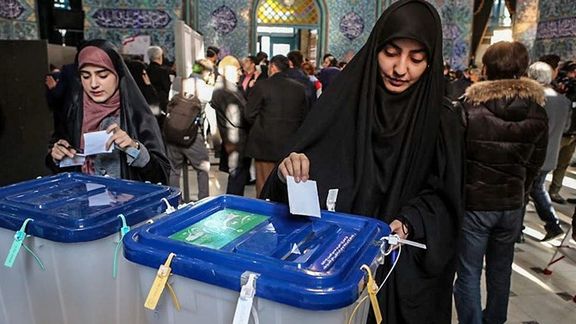Iranian Conservatives Jockey Ahead Of Lackluster Elections

With all the talk about Iran's fate in a possible escalation of war in the region, the parliamentary election on March 1 is not the foremost concern for Iranians.

With all the talk about Iran's fate in a possible escalation of war in the region, the parliamentary election on March 1 is not the foremost concern for Iranians.
Besides immediate fears of war and conflict, Iranian media also highlight expectations of a low turnout amid a general indifference to the regime’s highly manipulated elections.
Nevertheless, Iranian media are passionately discussing what the election might hold for Iranians, although almost all of them are quite sure that ultraconservatives will win the majority of seats in the parliament (Majles).
Reports in the reformist media alternate between the news of fresh divides and new alliances in the conservative camp. Arman Melli, a reformist daily, wrote last week with a high degree of certainty that "Conservatives are unlikely to reach unity."
The daily argued that although it is too early to predict what will happen in the conservative camp, the dynamics among conservative groups indicate that there is a likelihood of an alliance, and it is almost certain that Majles Speaker Mohammad Bagher Ghalibaf's name will be at the top of the conservatives' list of candidates.
This comes despite Ghalibaf not being the most popular figure among Iranian conservatives, as even members of the parliament have lately criticized him harshly for his inaction and his failure to establish the parliament's supervisory role.
Yet, the daily speculated that there are more signs in the conservative camp indicating divides among various groups. Arman Melli wrote that the sheer number of various groups is more indicative of divides than alliances. The daily noted that all conservative groups in Iran believe that unity is something good only if they are the leader of the alliance. This is what can easily turn the illusion of an alliance into solid signs of divide.
Another pro-reform daily, Arman Emrooz, wrote on January 16 that an alliance is likely to be formed by conservative groups, led by the hardliner Paydari Party, which holds the majority in the current Majles and most of the cabinet ministers of the Raisi Administration are its members. The daily argued that accepting Paydari's leadership is the only condition that can bring about an alliance among Iranian conservatives.
Arman Emrooz added that key conservative figures such as father figure Gholam Ali Haddad Adel and Assadollah Badamchian of the Islamic Coalition Party have already agreed that Paydari should lead other conservative parties and political groups. Although the two men are influential enough, but other conservative groups have still not voiced their views about Paydari's leadership.
Badamchain has recently said that his party has 200 candidates for constituencies all over the country. It appears that there is currently an agreement among conservatives that Paydari should continue to hold the majority of the Majles under the speakership of current Speaker Mohammad Baghert Ghalibaf. This was the arrangement that was first made after the current Majles convened for the first time in May 2020. Ghalibaf does not have a big number of followers in or out of the parliament, but despite essential differences, even Paydari agrees that as a relative of Supreme Leader Ali Khamenei, Ghalibaf can be a good leader for the Majles, and his kinship ties gives him the leverage to resist pressures coming from the executive branch.
However, Ghalibaf has powerful rivals in the internal election for choosing a speaker. Paydari's Leader Sadeq Mahsouli, and the Chairman of its Central Council Morteza Aqa Tehrani have always been serious competitors for the post. In the next Majles, there is a true conservative heavyweight Ghalibaf and others need to tackle: Mohammad Reza Bahonar. Even hardliner Mohammad Hossein Naqavi Hosseini says Bahonar stands way higher than others in the competition for the post of the speaker of the parliament.
The only thing that can stop Bahonar, a seasoned politician and a former Vice Speaker, from rising to the position of Speaker is a sold alliance among other conservative groups, Naqavi Hosseini said.